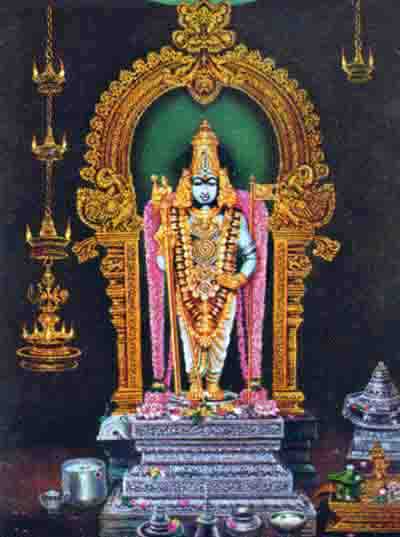
|
|
Śrī Dandayudhapani Swami, Palani |
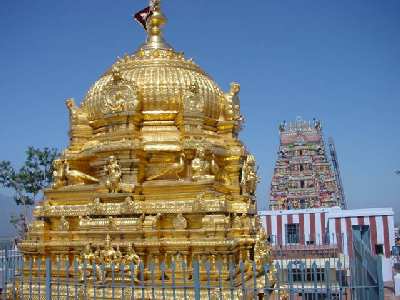
|
|
Golden Vimanam (at left) and Raja Gopuram, Palani |
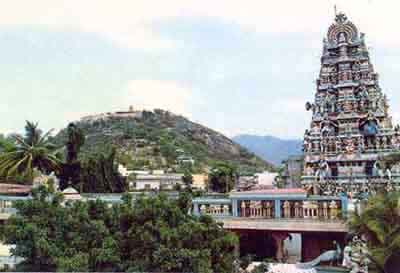
|
|
Tiru Avinankudi Tirukovil. Background: Palani Malai |
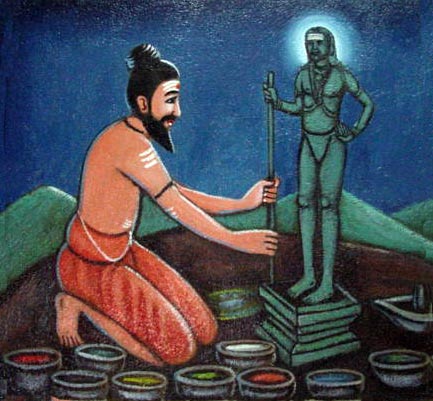
|
|
Bhogar, using the nine different minerals, creates the Dandapāni vigraha and sanctifies it. |
Arulmigu Dandayudhapani Swami Devasthanam, Palani
Palani Hill Temple and the IdolLord Murugan is the deity of the Tamil Land. Palani (Tiru Avinankudi) is the third Padai Veedu. The temple at Palani is an ancient one, situated at an elevation of 1500 feet above sea level. The deity of Palani is known as Dandayudhapani Swami, the Lord having the Staff in his Hand. The deity at the sanctum sanctorum is made out of an amalgam of nine minerals popularly called Navabashana. The deity is in a standing position with a baton in his hand. He has the look of a person who has renounced all worldly pomp. He has just a loincloth besides the baton. He is a mute messenger of the great precept 'Renounce all to reach Me'. The icon is unique in the whole world. It was made by siddha Bhogar by combining nine poisonous substances (navabashana). Murugan signifies beauty and Lord Murugan of Kurinji land is the god of Beauty and Youth. The Legendary, Historical and Spiritual Significance of the Hill TempleThere is a legend how Lord Murugan came to this sacred spot. Narada Muni, a sage, brought a golden mango to the divine court of Lord Siva when Lord Siva was seated with his consort Parvati and His children Lord Vinayakar and Lord Subrahmanya. Narada gave the fruit to Lord Siva and implored Him to eat since it was a rare, miraculous Jñanapalam, the fruit of wisdom. As a loving husband, Lord Siva gave it to Parvati and requested her to eat. As a loving mother, she wanted to give the fruit to her children. As there was only one fruit and it should not be cut, they announced a contest and said that the winner would be given the fruit. Whoever completes one round of the globe first will be given the fruit. Lord Subrahmanya mounted His peacock to go around the world. Lord Vinayakar circumambulated around His parents, symbolising the world, and got the fruit. On return, Lord Subrahmanya found that He was cheated. In anger, He renounced His family and came to this spot to settle forever. Lord Siva and Parvati came to pacify Him. They said, "Pazham Nee" ('You are the Fruit'). Hence the name Palani is a popular syncopation of the two words mentioned. The presiding deity, Lord Dandayudhapani Swami, is the son of Lord Siva and son-in-law of Vishnu. He has other names such as Kulandaivelan, Balasubrahmanyan, Shanmukhan, Devasenapati, Swaminathan, Vallimanalan, Devayanaimanalan, Palaniandavar, Kuriñjiandavar, Arumugan, Jñana Pandita, Saravanan, Sevar Kodiyon, etc. Tamils, Keralites, Bengalis, Sri Lankans, Malaysians, Fijians, Africans, Australians and Americans to name a few come here to worship Lord Muruga. Thus Murugan worship cuts across provincial boundaries and national frontiers.
Cheaman Perumal, a ruler of Kerala, built the main temple perhaps in the 7th Century AD. The Nayaks built the Navaranga Mandapam which is a fascinating stone structure incorporated by four pillars and endowed with nine bays. The other portions of the temple have been built by the Pandiya kings, besides a number of local heads, religious groups and individual devotees. Pujas There are six pujas every day. At 5 am the Lord gives Visvarupa Darshana. The first puja is Vizhapuja at 7:15 am followed by Kala sandhi at 8am, Uchikalam at 12 noon, Sayaraksha at 6 pm and Rakkalam at 8 pm. Golden Chariot The Golden Chariot goes round the praharam on the top of the hill in a ceremonious procession along with nadaswaram, Tiruppukazh music and other temple paraphenalia at 7 pm on all Karttikai days and as per the request of the devotees. The illuminated Golden Car is a veritable fairyland.
Festivals Panguniuttiram, Thai Pucam, Kanda Sasthi, Agni Nakshatram are the major festivals. Vaikasi Vishakam, Tirukkarttikai and other festivals are also celebrated.
Kavadi & Pada Yatra Devotees from various places bring different types of kavadis and offerings to the Lord by pada yatra or foot pilgrimage, the most popular time being Thai Pucam.
Bhogar ShrineThe Bhogar Shrine is in the southwestern corridor of the hill temple. Siddhar Bhogar created the icon (the amalgam of nine minerals) and did daily services. He lived long ago, perhaps 3000 BC. A medical prodigy as he was, he could prepare the amalgam on nine medicinal minerals in proper proportion. In this shrine, pujas are offered to Navadurga, Bhuvaneswari and Maragatha Lingam that were worshipped by Bhogar. It is said that there is a subterranean tunnel linking the shrine with the sanctum sanctorum through which Bhogar is said to go to the main idol and perform daily pujas as he is said to be only in nirvikalpa samadhi.
Pañchamirtam & Rakkala Sandanam Lord Muruga is Abhisekapriya (fond of anointment), especially Pañchamirta (fruit jam having medicinal properties). The Devasthanam prepares pañchamirta, vibhuti and other items which are sold for reasonable price. Like Pañchamirta, the Rakkala Sandanam (sandal paste placed on the deity during
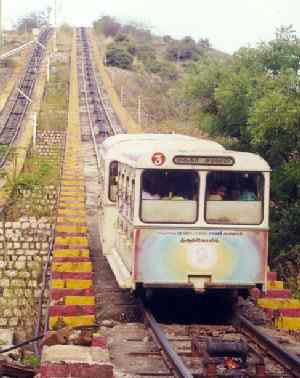
|
|
Winch trolley, Palani Malai |
|
|
|
Haulage Winch
To climb the hill, there are also winch trolleys in addition to the traditional route of 697 steps. The Hundial The Hundial is the cash collection box. It is the backbone of the economy of the temple. Palani Dandayudhapani Swami Devasthanam has the honour of being the temple of highest income in Tamil Nadu and second only in all India after Tirupati. 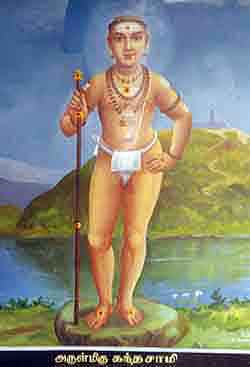 Annadanam (Offering meals to poor pilgrims) Giving annadanam at the hill temple at 12:30 pm is a useful scheme for the benefit of the devotees. If a donor deposits Rs 25,000, the interest of it will be utilised for annadanam on a particular day as per the request of the donor. Tonsure Ceremony Tonsure ceremony is a special feature of Palani. Many devotees of all ages perform tonsure ceremony at Palani. Constituent Temples Tiruvavinankudi, Periyanagaki Amman temple, Shanmuganadhi group of temples, Idumban Hills, Vishnu temple, Pada Vinayagar temple, 108 Vinayagar shrines around the hill temple, the Kuriñjiandawar temple (Kodaikkanal), the Velappar temple aat Poomparai (Kodaikkanal) are the important constituent temples adminstered by Palani Dandayudhapani Swami Devasthanam. Management
This temple is under the control of the Hindu Religious and Charitable Endowments Department of the Government of Tamil Nadu. There is a Joint Commissioner/Executive Officer to look after the day-to-day administration of Palani temples. He works in close association with the Chairman, Board of Trustees and other members.
|
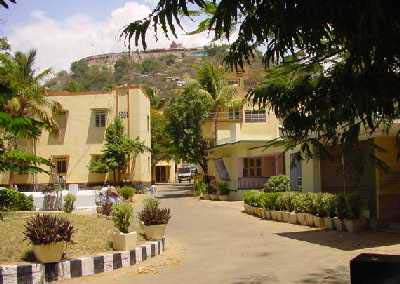
|
|
Devasthanam pilgrim accommodation: "Dandayudhapani Nilaiyam" |
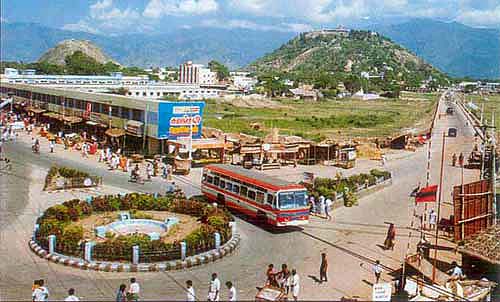 |
|
View of Palani Malai from Palani town centre |
Accommodation The Devasthanam has constructed pilgrims' resthouses, single, double, deluxe and air-conditioned rooms as well as cottages. Reasonable rates are collected from the devotees. Transportation Palani is reached by just three hours drive from any of the nearest airports: Coimbatore, Madurai and Tiruchy. It is an important railway station on the Dindugal-Coimbatore line. The nearest tourist information office is at Madurai. There is a Palani Devasthanam Information Centre at the Palani bus stand.
Shopping Panchamirtam, vibhuti, souvenirs of Murugan, toys, handicrafts, pictures of the Lord and publications of the Devasthanam are among the souvenirs one can bring home from Palani.
For contributions and further information please contact: The Joint Commissioner/Executive Officer
Arulmigu Dandayudhapani Swami Devasthanam Office
Adivaram Palani - 624 601 India
Tel. (91) 04545-41417 or 42236
Fax: (91) 04545-41417
| 







